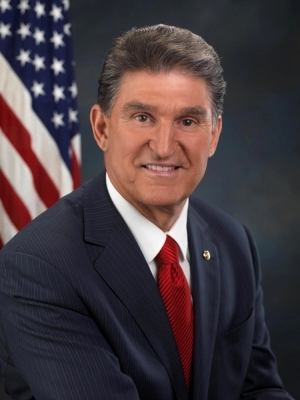WASHINGTON – West Virginia’s Shelley Moore Capito and Joe Manchin were among those U.S. senators who, on Tuesday, voted in favor of a measure that would effectively kill the Environmental Protection Agency’s new “Waters of the United States” rule.
The Senate voted 53-44, passing a resolution of disapproval to nullify the rule, which extends the federal agency’s authority to all bodies of water, no matter the size or frequency.
The rule was published in the Federal Register June 29. The EPA and the U.S. Army Corps of Engineers began enforcement Aug. 28. However, a federal appellate court last month issued a decision that stops the EPA and Corps from enforcing the rule.
“West Virginia’s farmers, small businesses, energy producers and agriculture community have shared their concerns with me about the burdens and uncertainty this regulation would impose,” Capito, a Republican, said in a statement. “Protecting our drinking water sources and precious natural resources is a goal we all support, but the WOTUS rule would lead to a massive expansion of costly permitting requirements, hampering farmers and rural communities and subjecting small puddles and ditches to the same regulations as large lakes and rivers.
“These are costs West Virginia’s already struggling economy cannot afford.”
Manchin, a Democrat, called the rule “overreaching.”
“The EPA wrote and finalized this rule without consulting some of the people who care about clean water the most: everyday West Virginians and Americans,” the senator said in a statement. “This overreaching rule would impose a heavy financial burden on all of us and would lead interruptions on myriad of economic activities in West Virginia, including highway and road construction, farming, and a variety of public works projects.
“It is completely unreasonable that under the EPA’s WOTUS rule, our country’s unnavigable waters would be subject to the same regulations as our greatest lakes and rivers, and we cannot allow this rule to be implemented as it is currently written.”
Two out of three Sixth Circuit judges sided with the petitioners -- Ohio, Michigan, Tennessee, Oklahoma, Texas, Louisiana, Mississippi, Georgia, West Virginia, Alabama, Florida, Indiana, Kansas, Kentucky, South Carolina, Utah, Wisconsin and the North Carolina Department of Environment and Natural Resources -- saying they demonstrated “a substantial possibility of success on the merits of their claims.”
West Virginia Attorney General Patrick Morrisey led the charge.
“Petitioners first claim that the Rule’s treatment of tributaries, ‘adjacent waters,’ and waters having a ‘significant nexus’ to navigable waters is at odds with the Supreme Court’s ruling in Rapanos, where the Court vacated the Sixth Circuit’s upholding of wetlands regulation by the Army Corps of Engineers,” the panel wrote in its six-page decision. “Even assuming, for present purposes, as the parties do, that Justice Kennedy’s opinion in Rapanos represents the best instruction on the permissible parameters of ‘waters of the United States’ as used in the Clean Water Act, it is far from clear that the new Rule’s distance limitations are harmonious with the instruction.
“Moreover, the rulemaking process by which the distance limitations were adopted is facially suspect.”
The rule extends the EPA and Corps’ regulatory jurisdiction to an untold number of small bodies of water, including roadside ditches and short-lived streams or any other area where the agencies believe water may flow once every 100 years.
Thirty-one states and state agencies have challenged the legality of the regulation, arguing it violates the Clean Water Act, the Administrative Procedure Act and the U.S. Constitution. They argue it also usurps their primary responsibility of management, protection and care of intrastate waters and lands.
The National Association of Manufacturers also has challenged the rule, filing a lawsuit against it in July.
NAM’s Vice President of Energy and Resources Policy Ross Eisenberg said of the Senate’s action Tuesday:
“Today, the Senate took a step toward ensuring and protecting manufacturing growth, productivity and competitiveness as the Obama Administration seeks to expand its regulatory reach to manmade and isolated features -- even if they are usually dry or too small to appear on a map,” Eisenberg said in a statement. “This burdensome, costly and expansive regulation is yet another example of an unbalanced regulation placed squarely on the backs of manufacturers.
“Protecting our nation’s waters is a priority for manufacturers, but we need a balanced regulatory approach that yields a regulation consistent with law and policy. The final waters rule does not meet this standard.”
The Senate’s vote came immediately after it failed to pass a separate bill, sponsored by U.S. Sen. John Barrasso, R-Wyo.
Barrasso’s bill, S. 1140, also known as the Federal Water Quality Protection Act, directed the EPA and Corps to issue a revised WOTUS rule that protects traditional navigable water and wetlands from water pollution, while also protecting farmers, ranchers and private landowners.
His bill, introduced in April with Manchin, Capito and others, would have required the EPA to consult with private industries, small businesses and state and local governments in redrafting the rule; the resolution passed Tuesday by the Senate would quash the rule.
